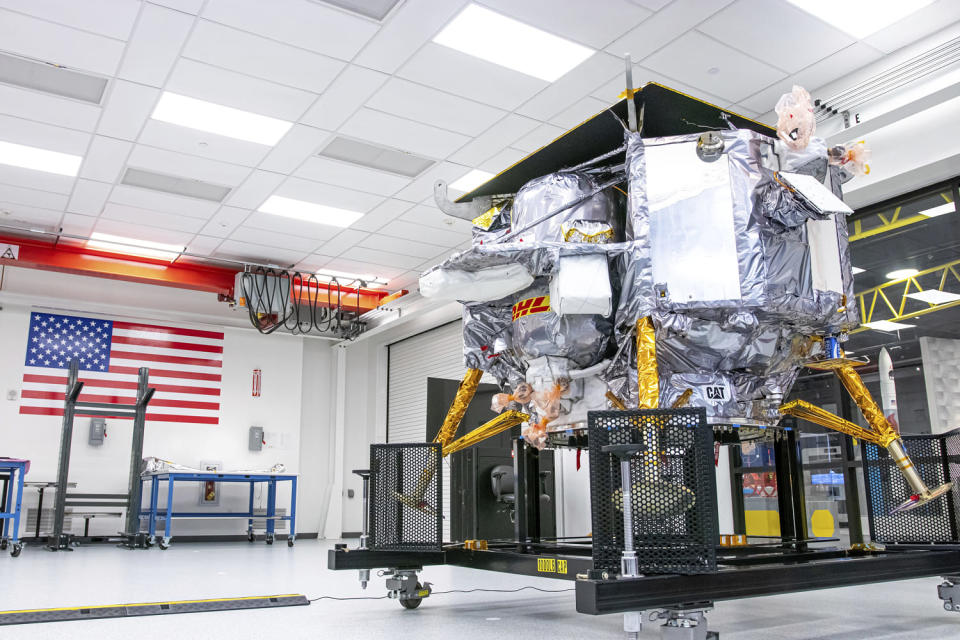The countdown is on for the launch of a privately built lunar lander on a quest to become the first commercial mission to successfully touch down on the moon.
The “Peregrine” lander, developed by a Pittsburgh-based company called Astrobotic, is scheduled to launch into space on Monday at 2:18 a.m. ET. The uncrewed craft will lift off atop the United Launch Alliance’s new Vulcan Centaur rocket from Cape Canaveral, Florida.
NASA said Friday that there is currently an 85% chance of favorable weather conditions for launch early Monday.
If all goes according to plan, the Peregrine mission could notch several historic firsts: The flight marks the debut launch of the next-generation Vulcan Centaur booster; and, if successful, Astrobotic could become the first private company to achieve a controlled, or “soft,” landing on the moon.
A successful touchdown would be a major milestone for the still-nascent commercial space industry, further opening up access to the cosmos beyond just governments and militaries to include more private enterprises. Only four countries’ space agencies — the United States’, the former Soviet Union’s, China’s and India’s — have pulled off a lunar landing, and so far, no commercial company has followed suit.

The moon mission is a private endeavor, but it is sponsored by NASA’s Commercial Lunar Payload Services program, which is a key part of the agency’s efforts to return astronauts to the moon. The initiative will allow NASA to dole out contracts to private firms to ferry scientific instruments and other equipment to the lunar surface.
“We think that this is a great approach to leverage entrepreneurship and innovation in the American industrial base,” said Joel Kearns, a deputy associate administrator with the Science Mission Directorate at NASA headquarters.
Kearns said partnerships with commercial providers will allow NASA to launch more frequent and cost-effective missions to the moon.
The Peregrine lander is the first spacecraft to launch under the Commercial Lunar Payload Services program. It will be carrying five NASA instruments to the moon, including gauges to measure the radiation environment on the lunar surface and spectrometers to study the abundance of materials such as hydrogen.
The mission will also be carrying several other nonscientific items, including payloads for two companies, Elysium Space and Celestis, that offer “space burials” by taking cremated remains into orbit or to the moon.
Astrobotic’s involvement with Celestis and Elysium Space has been controversial. Buu Nygren, president of the Navajo Nation, said in a letter sent last month to NASA and the U.S. Department of Transportation that leaving human remains on the moon would be “a profound desecration” of a celestial body that is sacred in many Indigenous cultures.
John Thornton, CEO of Astrobotic, said Friday in a news briefing that he was “disappointed” that the concerns were not raised earlier, but added that the company is “trying to do the right thing.”
“I hope we can find a good path forward with Navajo Nation,” he said.
If the Peregrine mission launches as scheduled on Monday, the lander will attempt to touch down on the moon on Feb. 23. The spacecraft is expected to land at a site known as Sinus Viscositatis, where ancient lava once flowed.
In a pre-launch briefing, Thornton said the Peregrine mission represents a major step for the commercial space industry in the United States. In particular, the flight could usher in a new era of space technology and innovation for Astrobotic and the city of Pittsburgh, Thornton said.
“We are bringing a new space state online,” he said. “Pittsburgh comes from steel and went through downturns in the ’70s and ’80s and has since reinvented itself, and this mission is a representation that if Pittsburgh can land on the moon, Pittsburgh can do anything.”
This article was originally published on NBCNews.com

Dr. Sarah Adams is a scientist and science communicator who makes complex topics accessible to all. Her articles explore breakthroughs in various scientific disciplines, from space exploration to cutting-edge research.







